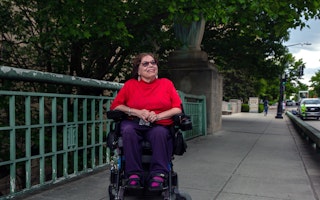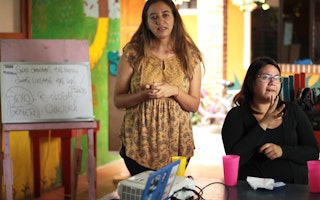
What are institutions?
Institutions are long-stay residential facilities that segregate and confine people with disabilities. They are characterized by a regimented culture. Institutions process people in groups and discourage individuality, impose mass treatment, and rely on a status imbalance between staff and residents. Institutions limit personal possessions, and have fixed timetables for activities like eating and walking—irrespective of residents’ preferences or needs.
Residents of institutions have no privacy or personal space, must live with people they have not chosen and may not like, and cannot pursue personal interests or relationships. An institution is not defined by size: even small-scale facilities can perpetuate these conditions.
What is deinstitutionalization and why is it necessary?
Deinstitutionalization is the gradual relocation of residents to regular, community-based housing. It is accompanied by the development of services that support inclusion and participation in the community, and that offer flexible and personal assistance, support, and coordination so people can live the lives they want.
Some institutions can transform themselves into community-service providers, redeploying staff to close the institution and providing supported housing, day services, and individualized support. This support includes transportation, job placement assistance, workplace assistance, and foster care for children with disabilities. Research across the globe demonstrates that people do better [PDF] when they leave institutions, almost without exception.
The segregation of people with disabilities is a human rights violation. The United Nations Convention on the Rights of Persons with Disabilities is an international, legally binding instrument that sets minimum standards for civil, political, social, economic, and cultural rights for people with disabilities. It acknowledges the right to “live in the community with choice equal to others,” and requires states to develop “a range of in-home, residential, and other community support services, including personal assistance to support living and inclusion in the community, and to prevent isolation or segregation from the community.” Most countries have signed the convention, and many of those have also ratified it.
Why not improve conditions within institutions to make them more humane?
While much of the criticism of institutions has understandably focused on derelict facilities and a horrible legacy of neglect and abuse, the real problem is the culture of institutionalization itself. Even when material conditions are reasonably good, institutions still deprive residents of essential freedoms, segregate them from their communities, suppress individual choice and personal expression, and foster a perception that people with disabilities are different and unable to take a place in society. No amount of fresh paint, repairs, or improved entertainment activities can make up for this.
For some people, isn’t an institution a better fit than the community?
Everyone—even those people with multiple and profound disabilities—can live in the community with the right support. Evidence shows that quality community services work, and lead to higher levels of personal satisfaction and social inclusion.
That does not mean that the process of deinstitutionalization is easy. For many people with disabilities, life in an institution is the only one they have ever known. Their experiences and choices have been severely limited. Like anyone experiencing significant changes, people with disabilities need support during transition.
Can some community-based alternatives be as problematic as institutions?
Dismantling institutional culture is as important as shuttering institutions themselves. Any service that exists in the community that does not allow people with disabilities to make their own decisions, act on their own terms, or that segregates them or marginalizes them, is an institution.
Won’t community-based services cost a lot more?
Deinstitutionalization is not a cost-cutting exercise; it is the way to ensure that the fundamental human rights of people with disabilities are upheld. That said, it is a common misconception that community-based services cost more than institutions. A study by the University of Kent in the United Kingdom found no evidence that community-based models of care are inherently more costly than institutions. Other research shows that institutional care may, in fact, be more expensive than community care.
Does deinstitutionalization contribute to homelessness and crime?
When governments close institutions without developing adequate community-based alternatives—as has been the case in the United States—many residents have neither the skills nor support they need to establish a satisfying and safe life in the community. Without housing, employment, social activities, and support networks, people leaving institutions may become socially excluded.
The development of adequate community-based services should always be undertaken in parallel with institutional closure. It is neither fair nor realistic to expect people, many of whom have lived most of their lives in institutions, to move to the community and thrive without such support.
How do the Open Society Foundations support deinstitutionalization?
For nearly two decades, the Open Society Foundations have supported civil society to advocate for the closure of institutions and the development of community-based services across Central and Eastern Europe, and the Caucasus. In particular, we have:
- supported the development of a number of community-based service providers such as Hand in Hand in Georgia, which established the first community living program for people with intellectual disabilities in the Caucasus;
- provided funding and technical assistance to several countries in the region to support them in developing community-based services as alternatives to institutions, including a five-year collaboration with the Croatian government to transition people with disabilities from two major institutions into community living;
- supported the development of self-advocacy groups to amplify the voices of people with disabilities so that they can be effective advocates for their rights, including their right to work and live in the community, and to vote; and
- supported organizations to monitor European Union funds and ensure that member states do not invest EU money in developing or maintaining institutions.
Read more
A Legacy of Action
Remembering a Fierce Champion of Disability Rights

She fought and won countless victories for disability rights with passion, commitment and kindness. Open Society honors the contributions of the late Judy Heumann
Justice for All
Q&A: A Different Approach to Disability

Gerard Quinn, the UN Special Rapporteur on the Rights of People with Disabilities, explains how he’s using his office to boldly push for a more inclusive world.
Accessibility for All
Q&A: An Inclusive Revolution

In Guatemala, women with disabilities face exclusion, stigmatization, and worse. Thankfully, one collective, Mujeres Con Capacidad de Soñar a Colores, is responding through research, organizing, and art.